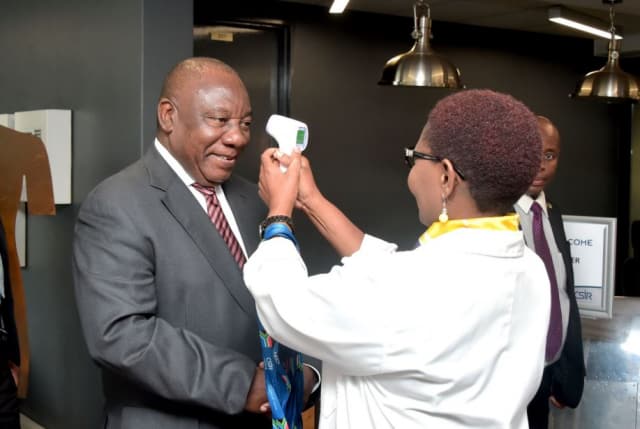South Africa’s President Cyril Ramaphosa on Thursday night announced the extension of the lockdown by two more weeks.
The lockdown, which started on 26 March 2020, was due to expire on 16 April.
South Africa’s first case of COVID-19 was reported on 5 March 2020, when a KwaZulu-Natal man came back home after travelling abroad.
“There is sufficient evidence that shows that the lockdown is working. Since the lockdown came into effect, the rate at which new cases have been identified in SA has slowed down COVID-19,” said Ramaphosa on Thursday night.
“If we end the lockdown too soon or too abruptly we risk a massive and uncontrollable resurgence of the disease. We risk reversing the gains that we have made in the last few weeks and rendering meaningless the sacrifices we have made COVID-19.
“Fellow South Africans, this evening I stand before you to ask you to endure even longer. I have to ask you to make even greater sacrifices so that our country can survive this crisis and so that lives can be saved COVID-19,” he explained.
“After careful consideration of the available evidence the National COVID-19 Command Council has decided to extend the nationwide lockdown by a further two weeks on the initial 21 days.”
The priority for the government is to ensure there is not a massive loss of life, while at the same time not allowing the economy to collapse.
This will see healthcare efforts ramped up, along with financial packages for local businesses.
Johannesburg is the epicentre of COVID-19 outbreak
The Gauteng province has rolled out its screening and testing campaign to all five districts, screening a total of 26 841 people and testing 440 of those who displayed symptoms of the Coronavirus (COVID-19).
Addressing a briefing by the Provincial Command Council on Thursday, Gauteng Premier David Makhura said healthcare professionals have conducted screenings as of 31 March in Johannesburg, Sedibeng, Tshwane, Ekurhuleni and the West Rand.
“Johannesburg is the epicentre of COVID-19 in the province and the country with 440 cases, followed by Ekurhuleni 111 cases, Tshwane with 90 cases, West Rand with 12 cases and Sedibeng with six cases. We have an additional 123 cases that are unallocated as of 8 April 2020,” Makhura said.
Gauteng has improved and enhanced its capacity to trace contacts using technology and so far 90% of all contacts have been traced.
“Being able to trace those who have come into contact with those who have tested positive is one of the key things that the world is battling with… this is very important in order to curb the spread of COVIV-19,” the Premier said.
Plans are in place for the province to improve contact tracing. There is a national process to assist the province with additional technology to do medical surveillance of those people who test positive, and their contacts.
Self-screening available for members of the public
The Gauteng Department of Health has added a COVID-19 feature to its Mpilo-Healthcare mobile app which offers self-screening to its users.
“We urge all those with handsets to use the app to ensure there’s seamless and easy screening by the public. We will be able to get that information and communicate with those that we think need to be tested,” the Premier said.
Makhura has assured healthcare professionals that there is an adequate supply of Personal Protective Clothing (PPE)
“We have been interacting with the trade unions in the public service. We have briefed the trade unions about our work including getting more PPE equipment,” he said.
In addition, the provincial government is working on increasing the number of beds, particularly for COVID-19.
“…In some of our existing healthcare facilities, we are clearing certain sections of the hospitals. We are also working with the private sector. We are identifying additional beds, and our team is at a stage of finalising how many beds we will get from the private sector for different purposes,” the Premier said.
Some of the beds will be for hospitalisation, high-care as well as well as intensive care, while others are for quarantine.
The province is working with municipalities to identify various facilities across Gauteng that will be used for quarantine.
Food Security
The Premier expressed gratitude to businesses and Non-Governmental Organisations (NGOs) that have worked with the provincial government to provide food to poverty stricken communities.
“Since the national lockdown, we have reached 15 000 households, this excludes the homeless people. We have been able to feed 60 000 people excluding the homeless people,” he said.
Homeless people have been reached through work that is being done by the NGOs, business and the Department of Social Development.
The Premier said law-enforcement agencies are conducting roadblocks on major roads and secondary roads on a day-to-day basis and are arresting people who are violating the regulations.
“We have improved in providing water to various communities in Gauteng. We have been able to reach areas who have problems with water supply. We will be able to reach every community in Gauteng to provide at least through water tanks where there is no other source of water. This will be provided working with the national government,” he said. – SAnews.gov.za



3 Comments
Pingback: Coronavirus: SA Liquor Makers Want Booze Restrictions Eased | TechFinancials
Pingback: Coronavirus: Bheki Cele Vows to Crack Down on Illegal Alcohol Sales
Pingback: Coronavirus: SA Food Chain Looks To Crowdfunding to Save The Business